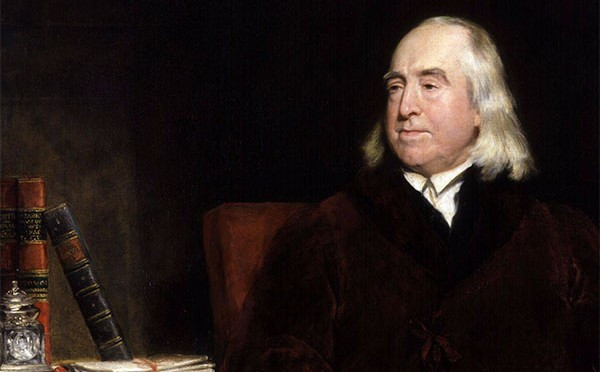Today marks the 40th installment in a series of articles by HumanProgress.org titled Heroes of Progress. This bi-weekly column provides a short introduction to heroes who have made an extraordinary contribution to the well-being of humanity. You can find the 39th part of this series here.
This week, our hero is Jeremy Bentham, an 18th century English philosopher, enlightenment thinker and social reformer. Bentham is regarded as the founder of utilitarianism – a philosophy that holds that the most ethical choice in any given situation is the one that will produce the greatest good for the greatest number of people. Throughout his life, Bentham advocated for many things, including the separation of church and state, individual and economic freedoms, women’s suffrage, the right to divorce, decriminalization of homosexuality and freedom of expression. He is also widely regarded as one of the earliest proponents of animal rights.
Although the impact of Bentham’s work was relatively small during his own lifetime, he inspired countless other thinkers and politicians who were successful in implementing an array of important social reforms.
Jeremy Bentham was born February 15, 1748 in London to a wealthy family. Reportedly, he was a child prodigy. At the age of three, he began to study Latin. By the age of seven, he was a gifted violin player, and would regularly perform Handel sonatas at dinner parties. As a child, Bentham attended the elite Westminster School. At the age of 12, he went to study law at the University of Oxford.
Bentham completed his bachelor’s degree in 1763, at the age of 15. He completed his master’s degree three years later. Although he was called to the Bar in 1769, Bentham never practiced law. During his time at Oxford, Bentham found he had little respect for the complexities of English law. Instead, he decided to spend his time trying to reform it.
Thanks to his family’s wealth, Bentham could devote himself to intellectual pursuits full-time. Bentham’s first book, titled Fragment on Government, was published in 1776. The book largely focused on rejecting Sir William Blackstone’s work Commentaries on the Laws of England, which aimed to set out the legal basis of the British constitution. Bentham rejected the famed jurist’s treatises, averring that England should “break loose from the trammels of authority and ancestor-wisdom on the field of law.” Instead, Bentham argued, the law should be based on the principle of utility.
Bentham once noted that the inequality of men and women under the law made him choose a career as a reformist at a young age. As such, his works often advocated for the complete equality of the sexes. In 1785, Bentham argued for the abolishment of laws that prohibited homosexuality. Although the essay remained unpublished during Bentham’s lifetime (likely out of fear of offending public morality), it remains one of the first arguments in favor of legalization of private same-sex relations.
On a 1785 visit to Russia, Bentham wrote his first essay on economics, titled Defence of Usury. The essay shows that Bentham held similar beliefs to those of the Scottish economist Adam Smith who is commonly dubbed the “Father of Classical Economics.” In the essay, Bentham argued against a planned economy and averred that each individual was the best judge of his or her own advantage. However, he differed from Smith in that he believed that interest rates should be allowed to float freely, rather than be set by a governing body. Bentham’s later works on political philosophy largely followed a laissez-faire approach.
In 1789, Bentham published one of his most successful books, titled An Introduction to the Principles of Morals and Legislation. The publication is often considered Bentham’s most important theoretical work. It was in that work that Bentham developed his theory of utilitarianism. Bentham suggested that humanity was governed by two primary motivations: pain and pleasure. The objective of all legislation, therefore, should be to ensure the “greatest happiness of the greatest number.” Having been inspired by Cesare Beccaria, our 38th Hero of Progress, Bentham believed punishment ought to be used only “so far as it promise[d] to exclude some greater evil.”
Bentham was raised in a Tory household, but his views on representative government departed from traditional conservatism. In 1809, he wrote A Catechism of Parliamentary Reform. The paper advocated for annual elections, the secret ballot, and a wider suffrage that included women, as well as the freedom for women to participate in government.
In 1823, Bentham co-founded The Westminster Review with his student James Mill (the father of the important classical liberal philosopher John Stuart Mill). The publication was described as a journal for the “philosophical radicals.” This group of Bentham’s disciples went on to have a significant influence in British public life.
In one of his later works, which was published as a letter to the editor of the Morning Chronicle in 1825, Bentham embraced the cause of animal rights. Bentham argued that, with regard to mindless torture or inflicting pain, the “insuperable line” should not be the ability to reason, but the ability to suffer. He argued that if the ability to reason was the sole criterion by which rights were attributed, then human infants (or people with certain disabilities) might fall short. However, Bentham did make it clear that animals could be killed for food or in defense of human life (providing the animal was not made to suffer unnecessarily).

On June 6, 1832, Bentham passed away at his residence in Westminster, London. He was 84. Bentham continued writing up to a month before his death. He left detailed instructions for his body to be dissected, and then be carefully preserved and displayed. Bentham’s wishes were fulfilled; to this day, his body remains on display in the Student Centre at the University College London.
Jeremy Bentham was one of the most important figures of the British enlightenment. Although his works led to no legislative reforms during his own lifetime, many of Bentham’s ideas had an enormous impact on shaping the development of rational, utility-based laws in many parts of the world. Bentham’s work has helped to shape a more humane world. It is for that reason that Jeremy Bentham is our 40th Hero of Progress.

